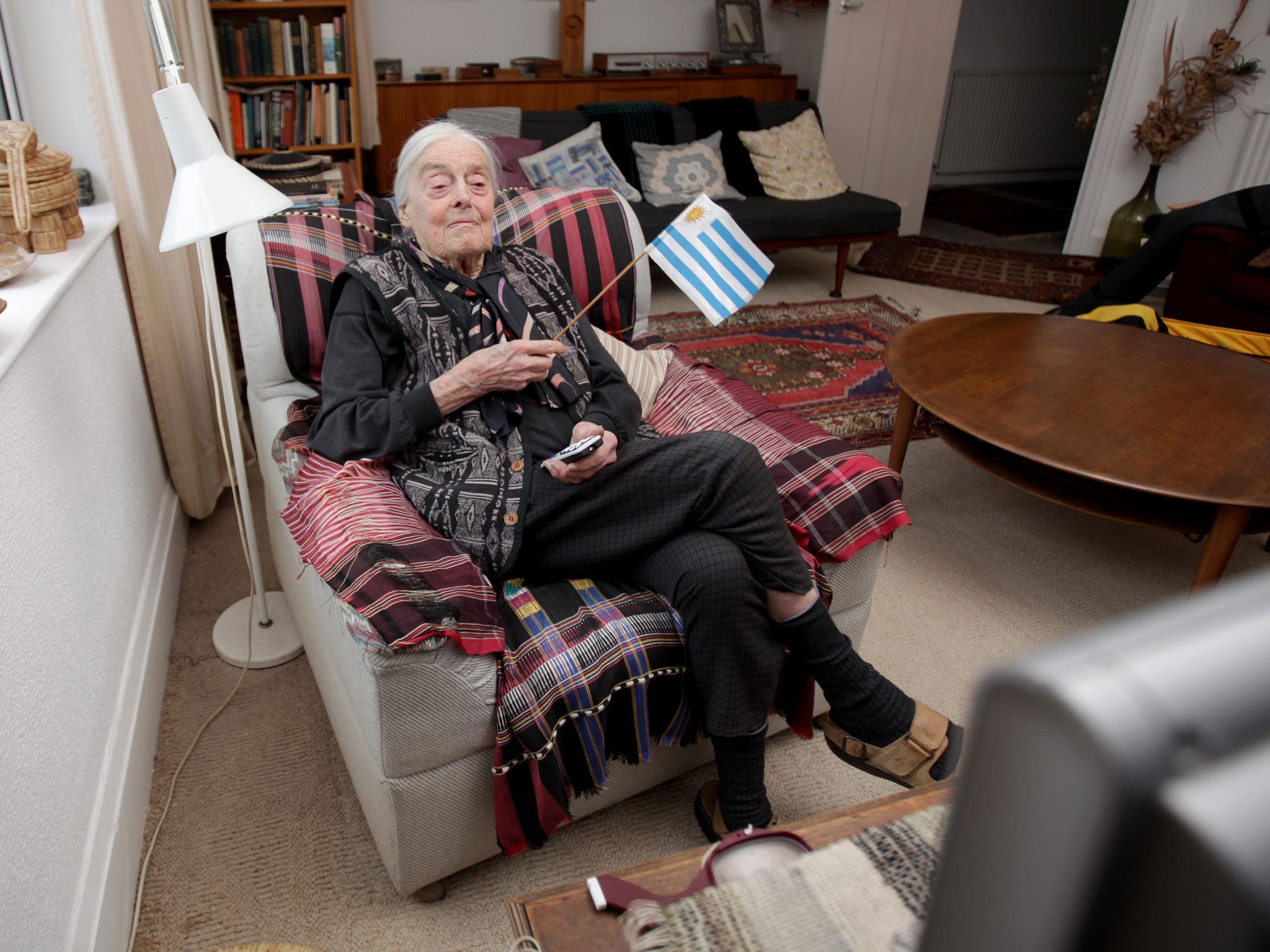Woman who witnessed first World Cup final 84 years ago gets ready for Brazil
Tanya Schmoller, 96, will be supporting her native Uruguay

Your support helps us to tell the story
From reproductive rights to climate change to Big Tech, The Independent is on the ground when the story is developing. Whether it's investigating the financials of Elon Musk's pro-Trump PAC or producing our latest documentary, 'The A Word', which shines a light on the American women fighting for reproductive rights, we know how important it is to parse out the facts from the messaging.
At such a critical moment in US history, we need reporters on the ground. Your donation allows us to keep sending journalists to speak to both sides of the story.
The Independent is trusted by Americans across the entire political spectrum. And unlike many other quality news outlets, we choose not to lock Americans out of our reporting and analysis with paywalls. We believe quality journalism should be available to everyone, paid for by those who can afford it.
Your support makes all the difference.At 96, Tanya Schmoller is pretty certain she’s the only person still alive in England who sat in the Estadio Centenario stadium in Montevideo to watch the first ever World Cup final in 1930.
Now 84 years after she saw Uruguay beat Argentina 4-2, the Uruguayan nonagenarian, who moved to Britain in the 1940s, will be glued to the television in her Sheffield home to watch as the festival of football once again return to South America this weekend.
The Brazilian World Cup will be the 20th competition that Tanya has followed, but she admits that her memories of Uruguay’s famous victory, which came before lucrative television rights, sponsorship deals and “overpaid” superstar players, are not as vivid as they once were.
“It really was a long-time ago now - I would have been 12 years old - and I can’t remember much about except going to the match and that we – meaning the Uruguayans – beat the Argentines and the population carried the Argentine flag around the streets of Montevideo in a coffin,” she told The Independent.
“I do remember that the stadium, which I think was built specially for the occasion at great cost, was in a beautiful tree-lined part of town near the British embassy and that I went there with my best friend and her father. I was at school in the city at the time and it really was a something of an event.”
Tanya and her friend will have joined 93,000 other supporters at the stadium to witness the famous exchange of Uruguayan and Argentinean officials arguing over who should provide the match ball. More than eight decades later fewer than 80,000 fans will flock to the Estádio do Maracanã stadium for the Brazil World Cup Final next month, but presumably FIFA will provide the ball.
Tanya, who was born in Uruguay to a British mother, first came to Britain in 1948 to work for Penguin Books but still has a Uruguayan passport and will be supporting her native team again this time around when they play England on June 19 in Sao Paulo.
“I’ve marked it on my calendar as it would be dreadful to miss it. Of course I’ll still be supporting Uruguay. I’m getting my flag out and hope to watch it with my grandson,” she said. “It will be difficult though as we are not as good as we once were and we’ve got to see whether Luis Suarez can play.”
She added: “Unlike most people in England I’m keen to see Suarez play. He’s every good, even though he might bite you if you’re not careful.”
After Tanya moved to England she forged a career in publishing, where she met her late husband, the famous book designer Hans Schmoller. She subsequently became involved in the arts scene after moving to Sheffield after his death and at the age of 81 went back to university to gain an Open University degree.
She still has strong links with her native country though with a “troop of nieces and nephews” in the country.
Her love of football also remains, she explains: “I’ve always been passionate about football and remember the first thing I knitted, when I was about six or seven, was a pair of football socks. And I was the village goalkeeper in the village in lived in outside of Montevideo.”
Despite her age she’s also quick to point out how the beautiful game has changed: “Back on 1930 England didn’t compete. It was before planes could fly across the Atlantic so they would have had to come by boat. Another change is that the players are paid a great deal more these days, though I’m not sure players today are of the same quality of those in the 1930s.”
Join our commenting forum
Join thought-provoking conversations, follow other Independent readers and see their replies
Comments